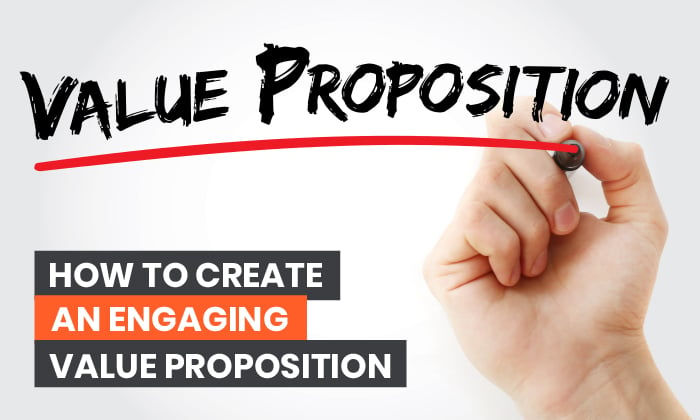
Warren Buffet once said, “Price is what you pay. Value is what you get.”
Having a solid value proposition is one way your company can illustrate and introduce its value upfront. In just a few sentences, your company’s value proposition should describe your main selling point and draw in customers. A good value proposition tells your customers what they can expect to gain by doing business with you.
What is a Value Proposition?
A value proposition answers the question, “What makes your organization special?” For example, Facebook’s value proposition is a simple one: “Connect with your friends and the world around you on Facebook.” Facebook’s answer to “What makes your organization special” is “we can connect you to anyone, anywhere.”
Think of it like this: Why should a customer pay attention to your brand in the first place? That’s where you should start when developing your value proposition.
A good value proposition includes three primary elements: relevancy, value, and uniqueness in the market.
- Relevancy: Why do your customers need your product or service? What customer needs are you meeting?
- Value: What do your customers have to gain by using your product or service? How can you help them with their bottom line?
- Uniqueness: What can you offer your customers that your competitors cannot?
Your value proposition should be the first thing visitors see when landing on your homepage. It should also be included in all major entry points to your website.
Why Should Your Website Have a Value Proposition?
Value propositions are beneficial for drawing in customers, but they can also help you define your business strategy. You can use your value proposition to guide you in your decisions about things like:
- innovations to your product or service
- defining your company’s work culture
- choosing graphics you use for your value proposition and across your site
- how to layout your website
- where you should place CTA buttons
- everything else that goes into effective web design and development
You are in good company when you create a value proposition for your business. 69% of B2Bs have established value propositions. However, sadly, studies show that only 2.2% of companies have value propositions deemed “useful” by consumers.
If you can get your value proposition right, stellar growth may be within your reach. Brands with a strong value proposition enjoyed 76% growth over a decade.
How to Format a Value Proposition
To create a unique value proposition, you should review your company’s benefits, costs, and value. In other words, what does your business bring to the table? How much are customers expected to pay and do they face any risks by doing business with you? Finally, how do your company and offerings make the customer’s life better?
A value proposition is not a tagline, slogan, or catchphrase. Nor is it a positioning statement (i.e. “We’ve been America’s #1 Truck for 40 years”).
Take the value proposition from electric car maker Tesla, which seeks “to accelerate the world’s transition to sustainable energy.” Now let’s analyze that value proposition (VP) so we can break it down into more manageable parts.
A value proposition should be:
Clear
Potential customers should be able to read your value proposition quickly and understand what your company has to offer in three seconds or less. Make sure it’s succinct and written with as few words as possible.
Tesla’s VP calls attention to the need for sustainable energy in a clear and concise manner.
Unique
Your value proposition notes what is special about your company. This is the “#1 thing” only your organization offers.
While Tesla is not the only electric car manufacturer, the company’s message of accelerating us into a more sustainable future certainly makes their VP more interesting.
Desirable
What you are offering is something people want and that few others offer.
Fast electric cars that support the environment is what Tesla is offering, and who doesn’t want that?
Specific
Finally, your value proposition needs to focus on a single message and communicate that message loudly. That message should be that your company stands head and shoulders above the rest.
Tesla’s value proposition is powerful and aims for a particular goal: to help us reverse our dependence on oil with fast and sustainable electric cars.
How Do You Incorporate Your Value Proposition Statement on Your Site?
You should get into the habit of trying to infuse your value proposition into every aspect of your site using copywriting and visual representations. From the headlines and body text to the primary and subsequent images you select, your value proposition should be well represented in every aspect of your website.
Here is an example of a value proposition format and steps you can take to get started creating your own.
Create an Engaging Website Headline
Your headline should be able to state the end-benefit your company offers in a single sentence. How will your consumers’ lives improve? Your headline should also grab their attention right away.
For example, if your company offers tax assistance, your headline might read “Easier Taxes Are a Click Away.” Written like that, your headline includes a large aspect of your value proposition. However, your headline only conveys part of your VP. Your images and the rest of your body text should communicate the rest, such as that you provide excellent customer service and a memorable tax preparation experience.
A site offering dating help may use the headline “Find Your Soulmate Using Our A.I. Matchmaker!” Once again, customers can find their matches using your service, but the rest of your website should convey the rest of your VP. That is, that your company offers enhanced matchmaking safety and more memorable first dates.
Not only do these headlines communicate what you offer (Tax Help vs. Love Matchmaking), but readers of your headline know right away how their lives will improve (easier time doing taxes, getting matched with the right person using the power of artificial intelligence).
Write a “Subheadline” or 2-3 Sentence Paragraph
Your headlines should be above the fold, followed by a subheadline or a few sentences. Above the fold means that your reader does not have to scroll to read that part of your content. They can land and read right away.
Your headline should be written to “hook” your reader, but your job is not finished yet. Your subheadline or follow-up sentences should offer a specific explanation of what you offer and why it’s useful. These elements should be written in such a way as to further entice your reader to continue down the page.
Using the above examples, we might have company value proposition paragraphs that look like so:
Tax Company
Spend more time doing what you love and leave the taxes to us. We help you find the right deductions, so you can keep more of the money you earn. Taxes don’t have to be difficult. Click the button below and discover how easy doing your taxes can be.
Dating Website
Tired of being matched with duds? Want to find your soul mate? Use the power of artificial intelligence and finally get matched with “The One” for a more enjoyable online dating experience.
Use Three Bullet Points
Your value proposition can now be placed into a set of bite-sized chunks, written as bullets that list your key features and benefits. These statements should be written with a focus on simplicity.
Using our examples, your bullet lists might say:
Tax Company
- We work with all types of businesses and tax classifications
- Instantly find all relevant deductions, saving you the most on your earnings
- All tax filings are double-checked by experienced tax professionals, ensuring full IRS compliance
Dating Website
- Get matched quickly – no more wasted time!
- All matches are carefully vetted. Feel safe when going on dates.
- Get matched with your soulmate, based on your specific criteria.
Notice how these value proposition statements get the point across about what the company does, and how the consumer’s life will improve.
Incorporate Visual Elements into Your Value Proposition
You can really hammer-home your value proposition on your homepage (and other pages throughout your site) by using images. Images communicate much faster than words.
You could showcase the product on your site with a clear and interesting view of all its most unique features. You might create a hero shot focusing on brand experience. Or, you can use an image that reinforces your main message.
Using our above examples, we might choose an image showing a person sitting happily in front of their computer, getting the instant tax help they need. A loving couple sitting across a table in a quiet restaurant, their faces framed by candlelight, might do the trick for the dating site.
Tips on Creating an Engaging Value Proposition
To create an engaging value statement, you can ask yourself questions like:
- What product/service is your company selling? You should give a clear overview of what your customers are buying.
- What is the end benefit of buying/using your product or service? How do you satisfy customer needs? And what customer experience can consumers expect?
- Who is your target customer? You will develop a stronger relationship with your audience if you can identify their wants, likes, dislikes, and biggest pain points.
- What makes your offering so unique and different? Your job is to find the exact words that describe your business and marketing strategy and unique selling proposition, so they appeal most to the customer segment you’re targeting.
Let’s look at some examples of value propositions and use the above checklist to determine if the value is clearly and accurately conveyed.
Examples of Great Value Propositions
Example 1: Dollar Shave Club
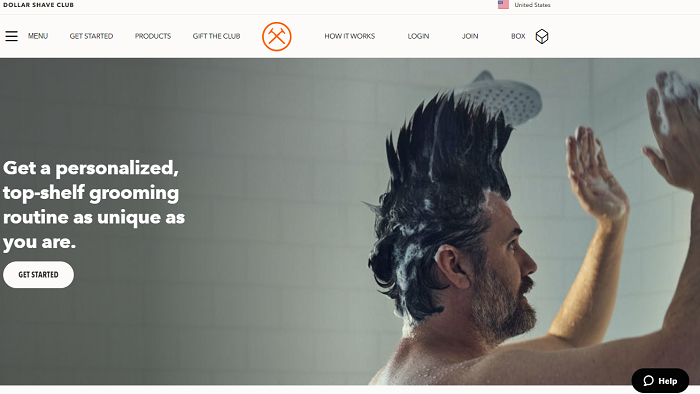
Personal grooming brand Dollar Shave Club offers personalized grooming supplies. Let’s look at our checklist to see how this brand stands up to the competition in the value proposition department.
What product or service is the company selling? Personal grooming supplies.
What is the end benefit? Personalized products and a top-shelf grooming routine.
Who is the target audience? Men who want the best and most unique grooming products.
What makes the offering unique and different? Lots of brands sell razors. No other brand offers personalized grooming products that are “as unique as you are.”.
Dollar Shave Club offers a wide range of products, an attractive shipping box stuffed with self-grooming goodies, and all at a “handsome” discount.
Dollar Shave Club has done an excellent job conveying why users should pay attention to the brand and open their wallets to subscribe.
Example 2: Grub Hub
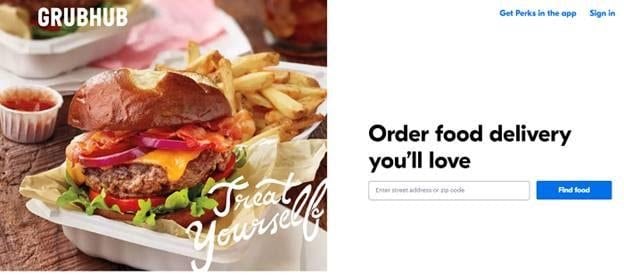
GrubHub negates the need to leave your home or office the next time you’re hungry and want your favorite meal. No matter what craving you have, a GrubHub rep can have hot and ready foods delivered right to your door. But do customers know that immediately upon landing on the Grub Hub home page? Let’s find out.
What product or service is the company selling? Food delivery you will love. Can’t get much clearer than that.
What is the end benefit? Treating yourself with comfort food, on-demand.
Who is the target audience? People who want food they will enjoy delivered.
What makes the offering unique and different? Uber Eats, Postmates, and DoorDash also deliver restaurant food to your door. Grubhub, however, promises food delivery “You’ll Love.”
The background image GrubHub chose for its homepage tops off this terrific and convincing value proposition. Who’s hungry for a cheeseburger and fries, delivered right to your door?
Example 3: Grammarly
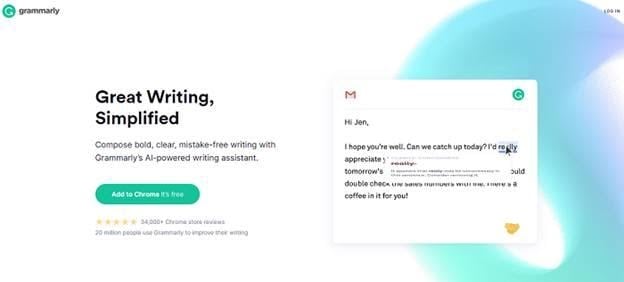
Grammarly is a robust content editor that integrates with Microsoft Word and Google Chrome. Scan your documents and the A.I. powered tool will detect spelling and grammar errors, comma splices, poor word usage, and plagiarism.
Does Grammarly’s home page offer a unique and compelling value proposition?
What product or service is the company selling? The service promises to make your writing great and to make the process of improving your writing simple. That value proposition is clear and concise.
What is the end benefit? Grammarly strives to help users compose bold and clear writing that is free of errors using the power of machine learning (A.I.).
Who is the target audience? Writers and editors of all kinds may derive benefit from using Grammarly.
What makes the offering unique and different? There are many spell-checkers out there. There are even apps to improve your writing. Grammarly ties all those benefits together to deliver a comprehensive editing software that makes your writing stand out. As an added benefit, it integrates with Microsoft Word, Microsoft Outlook, Google Chrome, Google Docs, and more!
The value proposition is further amplified by all the five-star reviews the brand has received, which is displayed underneath the button to further entice visitors to use Grammarly. Talk about social proof!
Example 4: Unbounce
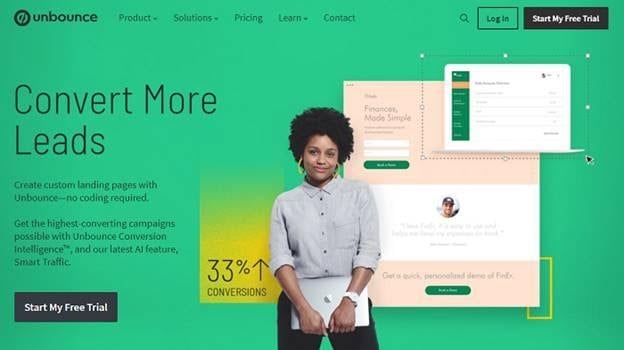
Unbounce helps businesses convert leads into buyers. Let’s look at our criteria to see how the brand measures against the rest.
What product or service is the company selling? Unbounce promises to make landing pages for the consumer without the need for coding knowledge. Customers are promised high converting campaigns using A.I.
What is the end benefit? 33% greater conversions!
Who is the target audience? Anyone struggling to find leads online is sure to be intrigued by the larger than life headline on the home page. The value proposition is clearly conveyed. It is also attractive for those who want to remain competitive yet lack the necessary coding or technical knowledge.
What makes the offering unique and different? What sets Unbounce apart from its competition is the promise of a 33% conversion increase. Keep in mind the brand has no idea what your company does or offers; with that kind of confidence, consumers everywhere are sure to want to give Unbounce a try, especially when presented with a free trial.
Unbounce has done a good job with this above the fold content. The value proposition is clearly conveyed and is likely to be attractive to its target audience.
Example 5: Constant Contact
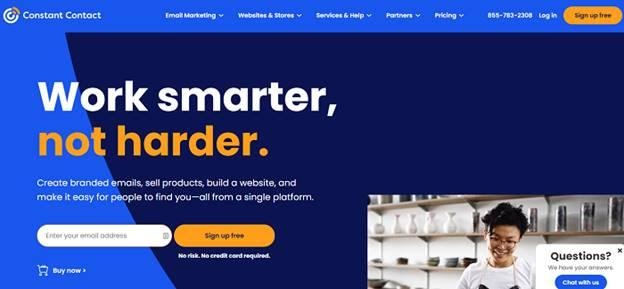
Constant Contact, a MailChimp email marketing competitor, helps businesses find success with email marketing for e-commerce.
What product or service is the company selling? Constant Contact wants you to work smarter, not harder. The company helps you accomplish this by offering customers the ability to create branded emails, and gives you access to website building tools, e-commerce, and digital marketing, all from one dashboard.
What is the primary benefit? Work more efficiently with all the tools you need to make it easy for people to find you.
Who is the target audience? The audience is anyone who struggles to find ways to attract and communicate with customers.
What makes the offering unique and different? Constant Contact gives customers everything they need to start selling online right away. Brands can even do so without a credit card and with no risk. That is an attractive offer for anyone who wants to keep up with their competitors on a limited budget, and without locking themselves into something permanent right off the bat.
How to Test Your Value Proposition
The checklist we used is only one way to determine if your value proposition will dominate your market. The only way to truly know if your value proposition hits home is to consistently look at your analytics, test your web elements often, and perform ongoing market research. All three of these exercises should be part of your regular conversion optimization routine.
Site Analytics
Look at how visitors react when landing on your website, as well as what keywords they are using in organic search to find you. Do they leave right away, causing your bounce rate to rise, or do they stick around and browse? Customer insights and behavioral tracking behind the scenes can tell you many things about the value proposition you have presented to your audience. While you can brainstorm the perfect value proposition, a data-driven one is far more effective, because you know it works.
A/B Testing
You can test the various elements of your value proposition on your site to improve conversion rates. An A/B test pits two different versions of your page against one another. You may test headlines, images, or your call to action.
Both versions of the page are shown to users, and the conversion data and statistics gleaned can then determine which version performs better. A/B testing tools like CrazyEgg can help make your value propositions more effective.
Market Research
While you are studying your site’s engagement metrics and testing the elements on your website, make sure you keep two fingers on the pulse of your market at all times. Study what your customers are buying, where they tend to hang out online, and buying trends as they pertain to your industry.
Only by understanding the market segment you are targeting can you hope to create the most effective value proposition.
That being said, as with most things, your market may change. When that time comes, you may find yourself tweaking your value proposition to meet audience demand. Be flexible and continue to study the market.
Conclusion
You have several examples of how to structure your company’s value proposition. It can follow any format, as long as it is unique to your company and to the consumers you do business with.
For your value proposition to attract the most customers, and for your organization to gain the most competitive advantage, you must clearly define who your customers are, what their main problems are, and how your offerings can help to solve those problems.
Don’t forget to add visuals to increase the ease of communication between your brand and your audience.
To boost the strength of your value proposition, and gain more market share, conduct market research, and test your website elements regularly. Doing so can help you determine which messages resonate best with your target audience.
Are you prepared to write a unique value proposition for your company?
The post How to Create an Engaging Value Proposition appeared first on Neil Patel.